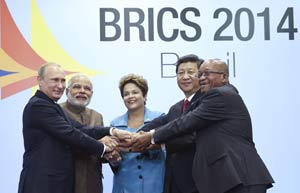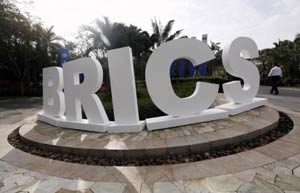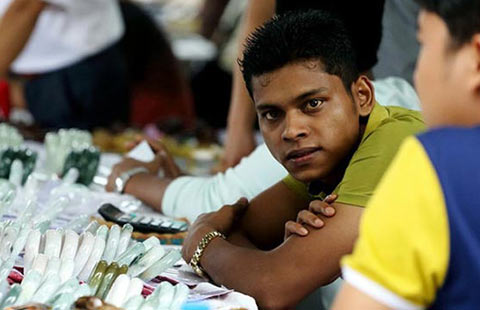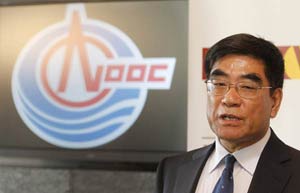BRICS bank should help the poor
By Kevin May (China Daily) Updated: 2014-07-23 07:37Yet details of what is planned are sketchy, and little is in the public domain. This needs to change. It is time for the discussion to move beyond the BRICS governments' current focus on technicalities around capital contribution and governance, and instead provide a solid vision for its mandate, the principles, priorities and objectives on which the new bank's activities and operations should be premised. BRICS countries should seize the opportunity to go beyond the growth-oriented development agenda toward more inclusive and sustainable solutions to end extreme poverty.
Therefore, the BRICS bank should be an instrument to promote pro-poor policies, food sovereignty and rural infrastructure, create sustainable jobs, improve livelihoods, and reduce the gap between rich and poor and between men and women, within the BRICS countries, as well as in other partner countries where projects will be implemented.
So what needs to be done? First, it is essential that the BRICS bank is operated in a way that puts fighting poverty and inequality at the heart of its mission. Second, the bank must be transparent and accountable both to BRICS citizens - whose money will form the bank's capital - and to people in borrower countries. And third, it needs to institute safeguards that protect and promote the interests of everyone affected by the projects it funds.
Among the five BRICS member states, China has made the largest contribution ($41 billion) to the Currency Reserve Arrangement, with Brazil, Russia and India contributing $18 billion each, and South Africa putting in $5 billion. But China could do more than just contributing to the bank's subscribed capital and the reserve pool. It could also make it work for the poor.
China has lifted more people out of extreme poverty than any other BRICS country (or for that matter any other country in the world) through reforms in rural areas, which include relatively equitable land distribution, complete rescindment of agricultural taxes and investment in infrastructure, supplemented by robust poverty alleviation programs in those areas. Chinese national development banks have a rich experience of making such reforms work, especially in the development of agriculture, rural infrastructure and support to small-scale enterprises. Moreover, already lending more to developing countries than the World Bank, the Export-Import Bank of China requires the offshore projects that it finances to conduct environmental and social impact assessments and respect local people's rights to land and resources.
China has an unprecedented opportunity and responsibility to draw upon these experiences to make the BRICS bank put the interests of the poor right on top of its agenda. It is an opportunity that has to be seized, for the sake of China and for the sake of the people living in poverty throughout the world.
The author is manager of China and the Developing World, China Programme Unit, Oxfam Hong Kong.
 |
 |
|
|
|
- Shanghai consumer goods imports on the rise
- VIP lounge closures spark online debate
- China to curb blind investment in coal-to-gas
- Chinese airline offers onboard Internet
- Smartphone maker Xiaomi launches latest flagship device
- China to contribute to new global trade system
- Xiaomi prepares for peak sales period with its new smartphone
- Dagong debuts in LatAm with its Suriname ratings















